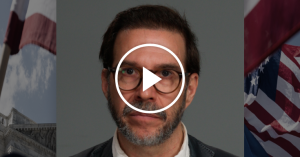Our scientific enterprise in the United States is the envy of the world. Top scientists from around the globe want to come to work here, specifically because of the environment that we have fostered over decades to support scientific innovation and intellectual freedom. Federal investment in research is one of the primary foundations upon which this extraordinarily successful system has been constructed.
It is not simply the dollar amount of federal funding that makes this system so successful. It is also about how we allocate and distribute the funds. Long before “DEI” was common parlance, we made robust efforts to distribute funds broadly. For example, instead of concentrating funding only in the top research institutions, as many other countries do, we created programs such as EPSCoR (1979) to direct funding to support research and development throughout the entire country, including rural areas. This was done in recognition that excellence in research can be found anywhere that and colleges and universities serving rural and impoverished communities deserve to benefit from and contribute to the economic and scientific engine that the federal government can provide.
The National Science Foundation also implemented Broader Impacts in its grant review process (originating in the 1960s and formalized in 1997). The goal of the NSF review criteria for broader impacts was to ensure that every federally funded project would have some benefit for society. These broader impacts could take a wide variety of forms, including but not limited to new tools and innovations, as well as efforts to grow the STEM workforce by supporting those historically and economically excluded from becoming scientists.
Diversity, equity and inclusion funding is one of the mechanisms that we use to continue this legacy of equity in federal funding of scientific research. This approach has also helped reduce public mistrust of science and scientists—a mistrust attributable to science’s historical abuses—by ensuring that the benefits of scientific progress are shared widely and equitably and by making the work of scientists more transparent and accessible.
Until fairly recently in history, science was primarily an activity for the wealthy. Training as a scientist requires many years of deferred salary, due to the extensive education and practical skill development needed to conduct independent research and start a laboratory. For those who make it through this training, research jobs can be scarce, and the salaries are not high, considering the highly specialized skills required and the high demands of the job. Many of the best and brightest minds have been excluded from the scientific process by this economic reality. Federal funding provides critical support for science workforce development, primarily through stipends and salaries for undergraduates, graduate students and postdoctoral fellows. These stipends ease (but do not erase) the economic burden of training as a scientist.
When you hear “DEI in science,” this is largely what we are talking about. A vast portion of federal DEI funds in the sciences goes directly to support highly talented and accomplished trainees who have deferred their personal economic progress for the opportunity to contribute to science in the U.S. This wise national investment helps to ensure that our science workforce can recruit the most meritorious trainees, regardless of their economic backgrounds. Without these initiatives, our science workforce would be much smaller with a narrower set of perspectives. Our national investment in science training is not altruistic—it is the very reason why the U.S. is a global leader in science and technology. This leadership contributes to our nation’s safety and capacity to deal with the existential problems we now face.
The framework of DEI recognizes that systemic economic and social injustices are present in our society, due to historical and contemporary realities such as slavery, Jim Crow, genocide of Native peoples, redlining, a broken immigration system, educational and health-care disparities, and discriminatory practices in housing and employment against nonwhite, disabled and LGBTQ+ communities. These disparities have resulted in a lack of intergenerational wealth and resources among many communities in the U.S., leading to unequal access to scientific training and careers.
The claim, now made by our federal government, that a meritocracy can be achieved by ignoring these injustices is simply false and illogical. DEI is not only about diversity training and hiring practices. In the sciences, it is essential and existential to the goal of developing the most robust, talented and highly skilled science workforce in the world.
With Executive Order 14151, issued by the Trump administration, this funding is under attack, undoing decades of progress that have fostered some of the most talented and brilliant minds of our time. Rigorous training programs are being canceled, graduate students are losing their funding and the training of an entire generation of scientists is being jeopardized. Science will lose an extraordinary amount of talent, necessary for our nation’s industrial and economic leadership, because of this executive order.
Furthermore, this removal of funding is being enacted on the basis of identity, effectively endorsing a form of government-imposed segregation of science. Advancements in science are often determined by the demography of those doing the science, and a diversity of perspectives and research questions is necessary for scientific innovation. For example, sickle cell disease is chronically underfunded and underresearched, despite the severity of the disease, likely because it affects descendants of people from regions with high instances of malaria, including many African Americans. Indeed, some scientific breakthroughs and technologies may never materialize or be greatly delayed due to the exclusion of talented individuals on the basis of their identity. This is a fundamental threat to scientific progress and academic freedom.
The federal banning of DEI programs is a slap in the face to every person who has struggled to become a scientist in the face of systemic injustices. These trainees, past and present, have missed out on economic opportunities, deferred building their families and made many personal sacrifices so that they can create innovative solutions to our nation’s most pressing scientific and technological challenges. The creation of these DEI programs came from the extraordinary efforts of thousands of people, many of whom have overcome injustices themselves, working tirelessly across many decades so that the most meritorious and talented individuals all have an opportunity to succeed as scientists.
Referring to these efforts as “shameful discrimination,” as the Trump administration has now done, is a cruel attempt to destabilize the emotional well-being of everyone who has created and been supported by these essential programs. It is an example of blaming the victims of past and ongoing injustice for their plight in society, rather than working to dismantle the systems that perpetuate inequality and limit access to a fair and just future, where a true meritocracy in science becomes possible.
We believe that the efforts to ban, diminish and misrepresent DEI and diversity, equity, inclusion and accessibility programs should be immediately stopped and reversed to avoid the most serious negative impacts of these new policies. Removal of DEI programs will demoralize and disincentivize an entire generation of scientists in training. It will greatly reduce the scientific workforce and remove top talent from our training programs as funding mechanisms are dismantled.
Our graduate students, undergraduates, postdoctoral fellows and other early-career scientists are those most greatly impacted by the removal of this support. This will severely jeopardize the status of the U.S. as a global leader in science, and the catastrophic impacts will be felt for decades. We stand by those most affected by the DEI ban, especially our trainees, and we demand an immediate reinstatement of DEI funding.
We are speaking out using the speech and intellectual freedoms afforded to us by the U.S. academic system and the U.S. Constitution. We are calling on our institutions to stand with us in defense of DEI in science. Institutions and professional societies must reaffirm their own commitments to DEI. Some institutions have already made strong statements of reaffirmation of these values, but others have begun to remove their internal and external DEI initiatives pre-emptively. We understand the need for institutions to protect their employees and students from adverse consequences, but we argue that the consequences of dismantling diversity programs are much greater for our communities, as these steps usher in a new era of segregation in science and academia.
We urge the public, our lawmakers and politicians to stand with us. We believe that DEI is foundational to science and an attack on DEI is an attack on the core of science itself in the United States.
Joseph L. Graves Jr. is the MacKenzie Scott Endowed Professor of Biology and the director of the Genomic Research and Data Science Center for Computation and Cloud Computing at North Carolina A&T State University.
Stacy C. Farina is an associate professor of biology at Howard University.
Parvin Shahrestani is an associate professor of biological science at California State University, Fullerton.
Vaughn S. Cooper is a professor of microbiology and molecular genetics at the University of Pittsburgh.
Gilda A. Barabino is president and professor of biomedical and chemical engineering at Olin College of Engineering.








